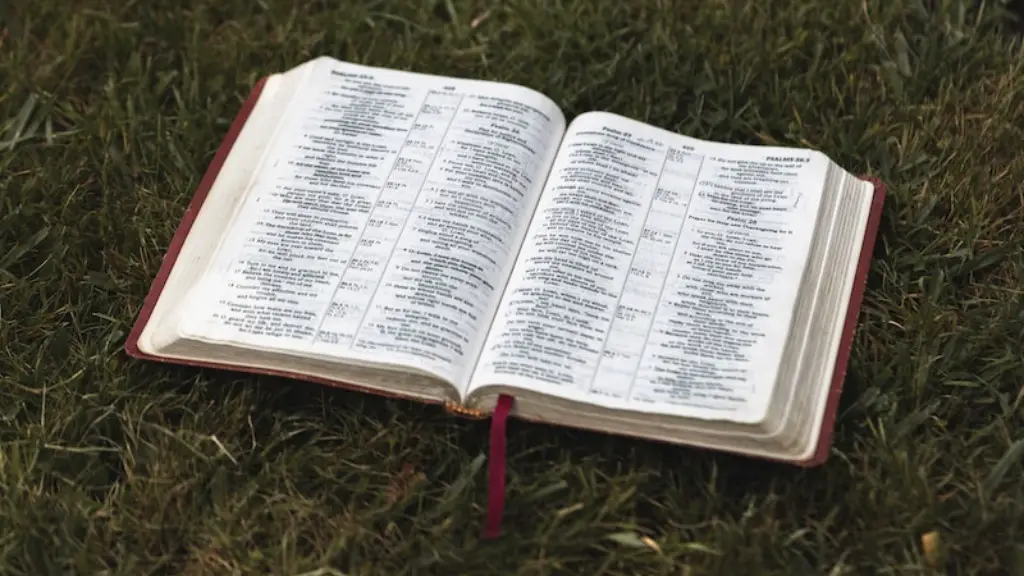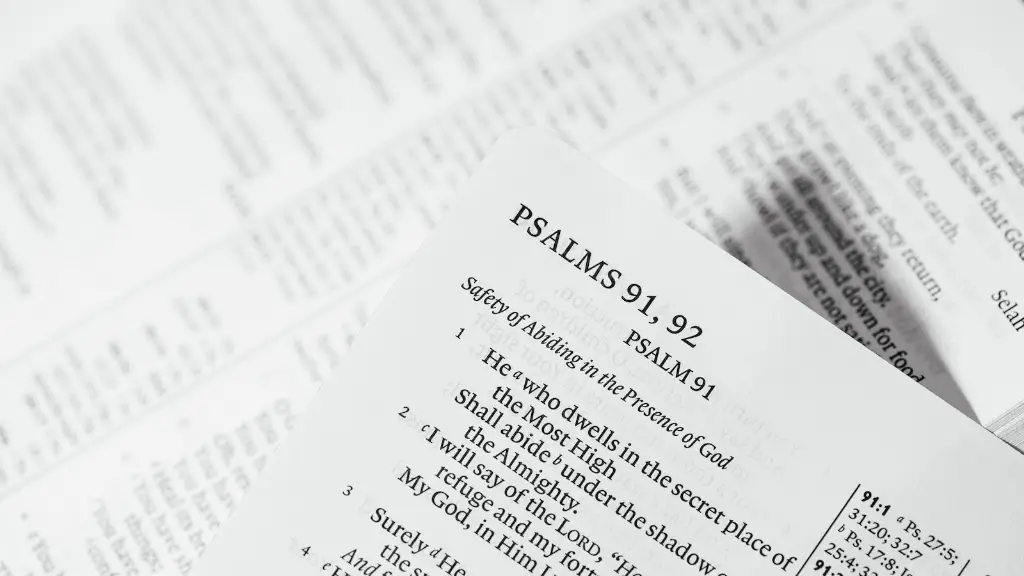Regret is a feeling of sorrow, remorse or regret for a life action that has happened and can no longer be changed. The Bible has a long and rich history of giving people advice on how to deal with regret. The Bible is filled with examples of characters who have experienced regret, as well as timeless wisdom that can be used to help us understand and manage these feelings.
“Therefore, if anyone is in Christ, he is a new creation; the old has gone, the new has come!” (2 Corinthians 5:17)
This verse speaks about how, through faith in Jesus Christ, we can be redeemed from our past guilt and regret and become a new person. It is about how worry and regret about the past can be overcome with the hope for the future. Paul, who wrote this verse, was a great example of someone who had been through a lot of regret – from persecuting Christians to becoming one himself – yet still overcame it to keep living with faith.
‘”Let all bitterness and wrath and anger and clamor and slander be put away from you, along with all malice”; (Ephesians 4:31) This verse speaks of the need to rid ourselves of the bitterness that can come with regret, in order to move on and live a life free of it. It shows us that we can leave our past behind, if we forgive people who have wronged us and forgive ourselves.
“Do not remember the former things, or ponder the things of the past,” (Isaiah 43:18)
This verse instructs us to let go of the things that can cause us regret, to focus our attention on more positive aspects of the present and future.
The Bible also speaks of how it is better to accept regret, instead of holding onto it and letting it consume us. Proverbs 24:16 reads, “For a righteous man falls seven times, and rises again, but the wicked stumble in time of calamity”. This speaks of how regret can be a part of the transformation of a person into a more righteous being, if it is not used to bring them down.
These examples from the Bible show us that regret is a normal part of life and should be accepted as such. Instead of dwelling on the negative aspects, we should look for the positive outcomes and lessons that regret can bring, and focus on the hope that the future brings.
Acknowledge and Confront Regret
It is important to acknowledge and confront regret head on. Rather than repressing our feelings of remorse, it is important to process these emotions and move toward resolution. The Bible offers many wise sayings on how to do this, such as: “My eyes are ever on the Lord, for only he will release my feet from the snare” (Psalm 25:15). This verse speaks of how we must trust in God and His plan, even if we don’t understand it or are in pain or regret.
Another wise saying is “Trust in the Lord with all your heart; do not depend on your own understanding” (Proverbs 3:5). When we are struggling with regret it can be hard to trust in God and His plan, so it is important to remember that He is always with us and His ways are greater than our own.
Another Bible verse about confronting regret is Romans 12:21, which reads, “Do not be overcome by evil, but overcome evil with good.” This encourages us to take action in the face of regret, to use it as a way of becoming a better person. This verse speaks to the idea that our regret can be used for good, if we are willing to face it and learn from it.
It is not easy to confront our regret; it can be a difficult process. However, with God’s help, we can move through this process of healing and come out on the other side stronger and wiser.
Forgiveness and Regret
The Bible speaks of the importance of forgiveness when it comes to healing regret. “Therefore, if anyone is in Christ, he is a new creation; the old has gone, the new has come!” (2 Corinthians 5:17). This verse speaks of the power of forgiveness, and how it can free us from our past guilt and regret. Jesus, through His death on the cross, has given us the ability to be forgiven for our sins and to start fresh, no matter our past. He has given us a new hope, which can be the source of motivation when it comes to let go of regret and start to heal.
The Bible also says “Bear one another’s burdens, and so fulfill the law of Christ” (Galatians 6:2). This verse speaks of the need to forgive and be forgiven in order to find healing from regret. It is important to understand that forgiveness is not just for the person we are forgiving, but also for ourselves. It is a way to free ourselves from the burdens of regret that can often weigh us down.
The Bible also speaks of the importance of asking for forgiveness from those we have wronged. Matthew 5:24 speaks of how it is important to reconcile with those we have hurt in order to be in right standing with God. By asking for forgiveness, we can be healed from our regret, and our relationship with God and others can be restored.
Letting Go of Regret
After we have acknowledged and confronted our regret, the next step is to learn how to let it go. The Bible teaches us that, while it is okay to feel regret, dwelling on it and letting it consume us is not healthy. Philippians 3:13 says, “Forgetting what is behind and straining toward what is ahead”, which encourages us to focus on the bright future that lies ahead of us, instead of dwelling on our past mistakes.
It is also important to not dwell on our regret too long. Ecclesiastes 7:8 reads, “The end of a matter is better than its beginning, and patience is better than pride”. This verse speaks of how we can learn from our mistakes and use them to give us wisdom for the future, rather than letting them control us and our decisions.
The Bible also speaks of how we can find comfort and hope in times of regret. Isaiah 41:10 reads, “Fear not, for I am with you; be not dismayed, for I am your God; I will strengthen you, I will help you, I will uphold you with my righteous right hand”. This verse reminds us that God is always with us, even in the midst of our struggles, and that He will help us in our time of need.
Restoration and Regret
When we have let go of our regret and forgiven ourselves and those who have wronged us, the next step is to focus on restoration. The Bible encourages us to seek reconciliation with those we have hurt and to move forward in His plan for us. Romans 12:18 reads, “if it is possible, as far as it depends on you, live at peace with everyone”. This verse speaks of the importance of seeking peace, even when we do not deserve it, in order to make amends for our mistakes.
The Bible also says, “Whatever you do, do it heartily, as to the Lord and not to men” (Colossians 3:23). This verse reminds us that it is important to focus on pleasing God and not pleasing people. As we go through the process of restoring our relationships, it is important to remember that our only goal should be to please the Lord and not worry about what others think.
Finally, Colossians 3:15 reads, “Let the peace of Christ rule in your hearts, since as members of one body you were called to peace”. This verse speaks of the importance of seeking peace with one another as a way of achieving purity of heart, and reminds us that regret can be used to make us stronger in our faith.
Pursue a Life of Faith and Joyful Living
The Bible speaks of how we should pursue a life of faith and joyful living, even when we have experienced regret. Jeremiah 29:11 reads, “For I know the plans I have for you,” declares the Lord, “plans to prosper you and not to harm you, plans to give you hope and a future”. This verse speaks of God’s love for us, and how He has a plan for us, even if we have made mistakes and experienced regret.
Another important scripture is Proverbs 3:5-6 which states, “Trust in the Lord with all your heart, and lean not on your own understanding; in all your ways acknowledge Him, and He shall direct your paths”. This verse reminds us of God’s never-ending love and faithfulness, and encourages us to put our trust in Him.
The Bible also speaks of how we should use our regret as an opportunity to learn and grow. James 1:2-4 reads, “Consider it all joy, my brethren, when you encounter various trials, knowing that the testing of your faith produces endurance”. In other words, we should use our regret and our experiences to learn and grow closer to God, rather than just dwelling on our failures and mistakes.
Conclusion
Regret is a part of life, and the Bible has a wealth of advice on how to manage it. By confronting our regret head on, seeking forgiveness, and letting go of the past, we can learn to accept it and allow it to make us stronger. We can then pursue a life of faith and joy, rather than dwelling on regrets and disappointments. God’s love and faithfulness offers a beacon of hope, even in the darkest times. The Bible speaks to the importance of trusting in His plan, no matter what our past holds.





